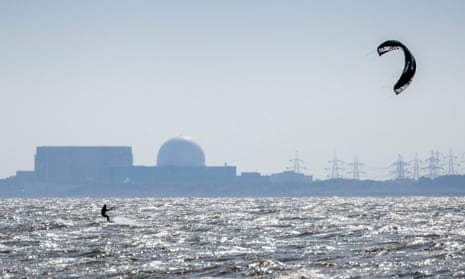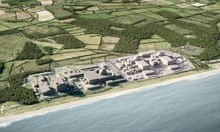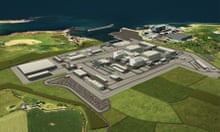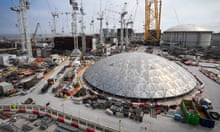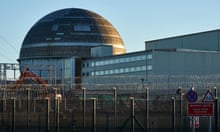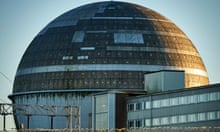The government has confirmed the Sizewell C nuclear power plant in Suffolk will go ahead, backing the scheme with an investment of nearly £700m that will end China’s controversial involvement.
Ministers said the move to take a 50% stake in the project’s development, first announced in Jeremy Hunt’s autumn statement, would create 10,000 highly skilled jobs, provide “reliable low-carbon power” to the equivalent of 6m homes for more than 50 years, and help boost UK energy security. The government also said it would set up an arm’s-length body, Great British Nuclear, to develop further nuclear projects.
The decision is likely to be seen as a turning point in UK energy policy, after decades of successive governments balked at the cost of building large reactors.
The UK’s nuclear power generation peaked in 1995 at 12.7 gigawatts of capacity, but then declined as focus shifted first to gas and then to wind and solar, which have far lower setup costs and do not produce dangerous waste. However, the Sizewell plant is expected to provide 3.2GW of capacity, equivalent to a 10th of the UK’s current needs.
The government had initially sought investment in Sizewell from state-owned China General Nuclear, but it U-turned amid increasing geopolitical tensions. It confirmed on Tuesday that the Chinese stake in the development would be bought out. The government said it would look for other investors before making the final investment decision and beginning construction, with some estimates putting the total cost as high as £30bn.
The plant on the Suffolk coast north of Aldeburgh, developed by the French energy company EDF, will be the second of a new generation of UK nuclear power reactors, after the delayed Hinkley Point C scheme in Somerset, which is under construction but has experienced delays and climbing costs since it was first given the go-ahead. Sizewell C will be built next to Sizewell B nuclear power station.
The UK’s EDF Energy chief executive, Simone Rossi, said replicating Hinkley Point C’s design at Sizewell would provide more certainty over schedule and costs, adding: “It will deliver another big boost to jobs and skills in the nuclear industry and provide huge new opportunities for communities in Suffolk.”
However, opponents of the scheme criticised the approval decision on cost and environmental grounds. The Greenpeace UK policy director, Doug Parr, said: “The launch of Great British Nuclear is clearly ironic as new nuclear is neither great nor British. Projects have been plagued by massive delays and ballooning costs while the government is seeking to have Sizewell C – a French-designed and built reactor – funded by foreign investment funds.”
Parr said there were “better, quicker and less expensive options to deliver electricity”, as well as new solutions to storing energy from intermittent renewable generation.
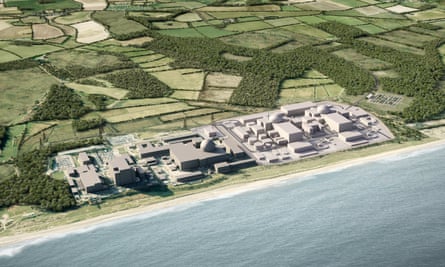
A spokesperson for Stop Sizewell C, a local campaign group, said: “Sizewell C can neither lower energy bills nor give the UK energy independence. Despite the government’s paltry £700m, there is still a huge amount of money to find, and no one is prepared to come clean about what the ultimate cost will be.”
after newsletter promotion
The Sizewell announcement comes after ministers also set out plans to reduce energy demand by 15% by 2030, with a new £1bn “eco plus” energy efficiency scheme, and a public awareness campaign – previously blocked under Liz Truss’s administration as being too “nanny state” – to help save energy this winter.
Rishi Sunak is under pressure, including from some Tory MPs, to U-turn on plans to retain the ban in England on onshore windfarms – one of the cheapest forms of energy.
The business and energy secretary, Grant Shapps, said: “We need more clean, affordable power generated within our borders … today’s historic deal giving government backing to Sizewell C’s development is crucial to this, moving us towards greater energy independence.”
The Nuclear Industry Association chief executive, Tom Greatrex, said the announcement was “a defining moment for UK energy security”. He said: “Sizewell C will be one of the UK’s most important green energy projects ever, cutting fossil fuels, providing clean, affordable power for a very long time, and creating thousands of highly skilled jobs.”
Greatrex also argued that nuclear power should be treated as sustainable energy under investment regulations, a designation that would allow investors to put money from environment-focused funds into the Sizewell project.
